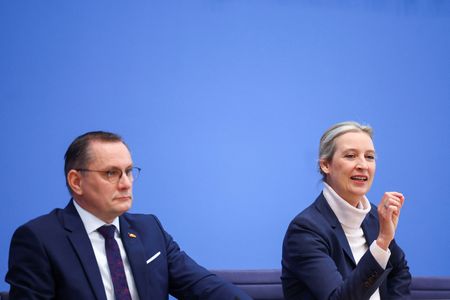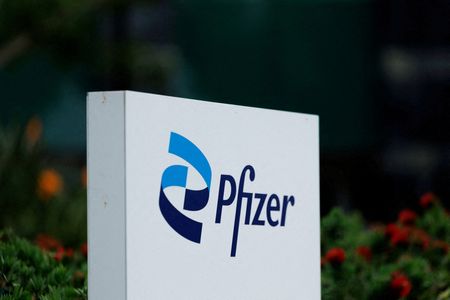By Maria Martinez and Christian Kraemer
BERLIN (Reuters) – The far-right Alternative for Germany (AfD) and the Left Party jointly secured one third of seats in the new parliament, enough to block a loosening of Germany’s debt brake – a mechanism some investors and political parties say stymies economic growth.
The euro and German stocks rallied as investors welcomed the strong likelihood of a conservative-led coalition following Sunday’s election, while German business leaders called for the swift formation of a new government, saying Europe’s largest economy could not afford to waste any time as companies suffer from high costs, red tape and rising foreign competition.
Markets are now focused on the chances of reforming or scrapping the debt brake. This mechanism limits budget deficits to 0.35% of gross domestic product, though that excludes top-ups of the special fund for defence or creation of any new fund.
However, both the AfD and the Left oppose military aid to Ukraine, and with their new-found strength in the Bundestag lower house they could veto increased defence contributions.
Leaders of the Left Party said on Monday they supported a reform of Germany’s debt brake but on condition that this was not used to hike defence spending.
“We have to invest in social infrastructure, and if that doesn’t happen, then we won’t vote for it either,” said party co-chief Ines Schwerdtner. “We will not vote for rearmament.”
Germany’s outgoing parliament still has the majority needed to reform the debt brake before a new coalition is formed but such a move by the current assembly is “unrealistic”, Finance Minister Joerg Kukies told Reuters in an interview on Monday.
“First of all, there’s far too little time, and secondly, it would also be a questionable political signal if constitutional amendments were now made with an old majority,” Kukies said.
German conservatives under likely next chancellor Friedrich Merz have vowed to move quickly to try to form a coalition after winning the most votes in Sunday’s national election.
The most likely outcome is a coalition of Merz’s conservative bloc and the Social Democrats (SPD), who came in third, after the AfD surged to a historic second place.
Germany’s Ifo economic institute stressed the urgency of forming a new government.
“The German economy is in waiting,” said its president Clemens Fuest, after Ifo’s business climate index came in at 85.2 for February, flat on the previous month.
INFURIATING TRUMP?
Holger Schmieding, chief economist at Berenberg, said the new coalition may struggle to find the fiscal space to raise spending on defence while also easing the tax burden for workers and firms.
“A failure to ramp up military spending could get Germany into deep trouble with its NATO partners,” Schmieding said. “By infuriating U.S. President Donald Trump, it could also add to the risk of a U.S.-EU trade war.”
Economists said enlisting the cooperation of the Left would prove very difficult for Merz.
“The Left would like to ditch the debt brake. However, its agenda – soak the rich, spend more on welfare and less on defence- is the very opposite of the Merz agenda,” said Carsten Brzeski, global head of macro at ING.
In order to increase defence spending from the current 2% of GDP to 4%, for example, the federal government would have to cut non-defence spending by a quarter if this were not to be financed by additional debt, said Joerg Kraemer, chief economist at Commerzbank.
Kraemer said a Merz-led government might find that its only politically feasible option is to suspend the debt brake by invoking an “extraordinary emergency situation”, which is possible with a simple parliamentary majority.
(Reporting by Christian Kraemer and Maria Martinez; Editing by Gareth Jones)












